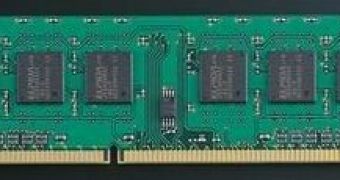As it often happens when a next-generation technology emerges, the previous generation of products gradually drops in popularity, until producers of said technology are faced with low demands unable to keep up with the growth in inventories. Currently, such a situation is plaguing Korean DRAM makers, which are having difficulties cleaning up their DDR2 supplies. In a not-so-stunning turn of events, however, those same DRAM makers have adopted the age-old bundling strategy and are now going to start selling DDR2 along with DDR3.
2009 was a slow year for the industry and the semiconductor segment was especially affected. Besides Samsung, Qualcomm and Mediatek, all semiconductor makers saw revenue drops. In fact, the memory and consumer electronics and wireless chips segments were the ones that performed the best under the conditions of the economic recession.
According to DRAMeXchange data, market prices for 1Gb DDR3 memory chips running at 1333MHz were of US$3.08 on average on January 18, compared with the US$3.01 on January 8. In parallel, average prices of DDR2 1Gb chips at 800MHz dropped under US$2.50. Currently, premium offers of DDR3 are “priced at a premium of more than 25% over DDR2 ones,” Digitimes reports. In addition, the average 2GB DDR2 prices remained at US$41 during the first part of January, whereas the “2GB DDR3 segment rose 2-5% to average US$41.”
According to research firms and companies, the point where DDR3 shipments will exceed those of DDR2 is very close. While dwindling demand has led to rapidly growing DDR2 inventories, growing demand has been causing difficulties for DRAM makers when meeting DDR3 orders. The bundling of DDR3 with DDR2 is meant to avoid the widening of the price gap between the two standards, by minimizing the impact caused by DDR2 oversupply and DDR3 shortage.
Already, certain “downstream channel distributors have followed suit and deployed such bundling sales strategy, in a move to promote DDR2 memory,” Digitimes sources say.

 14 DAY TRIAL //
14 DAY TRIAL //